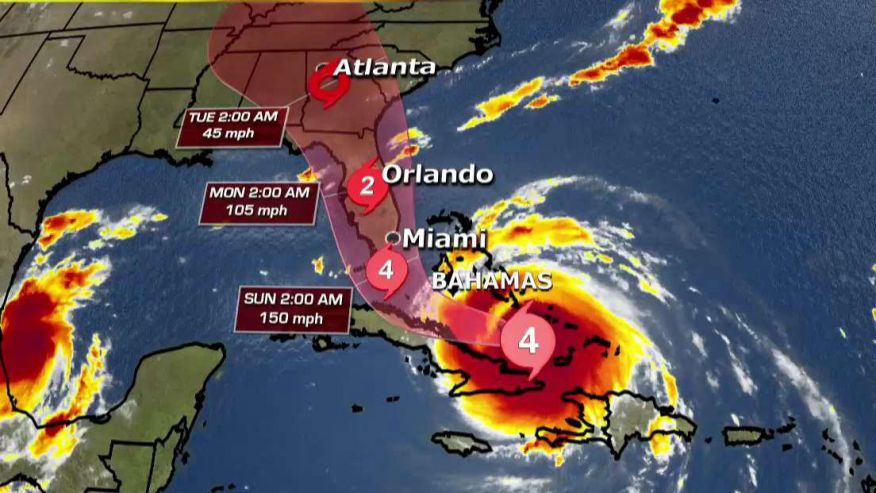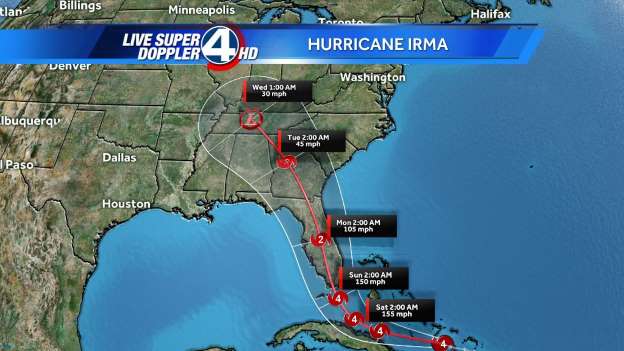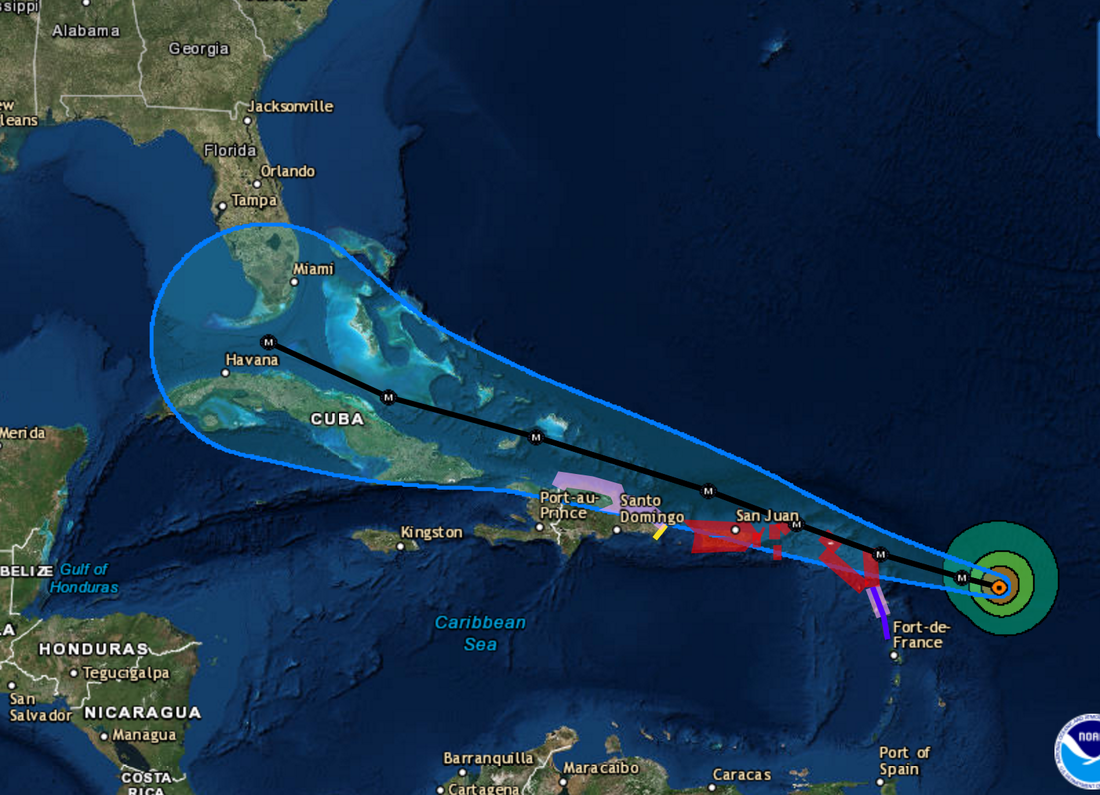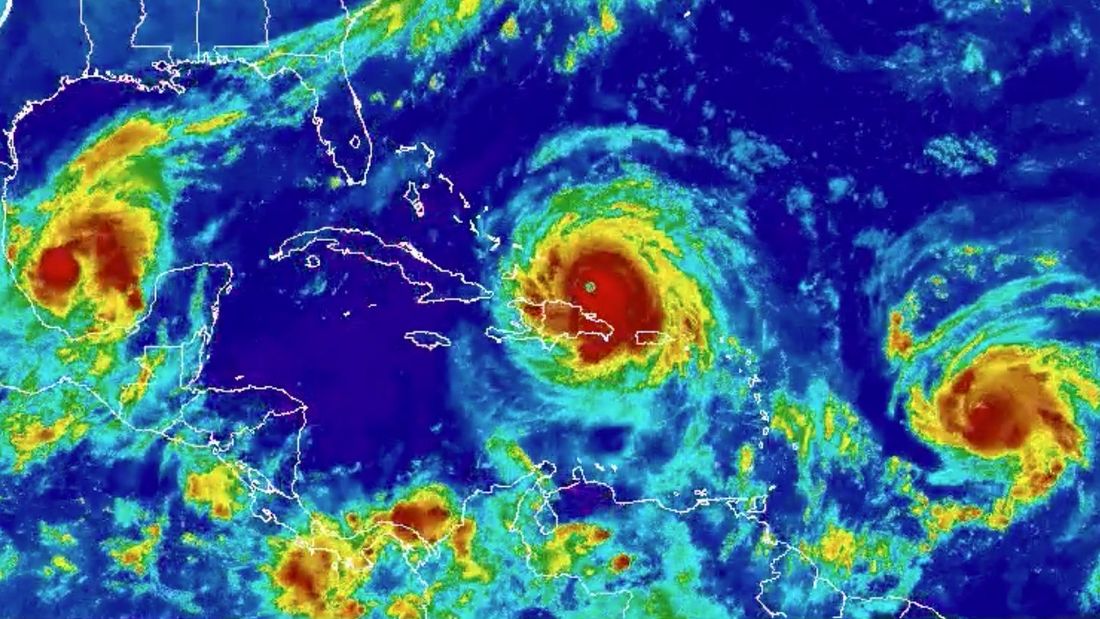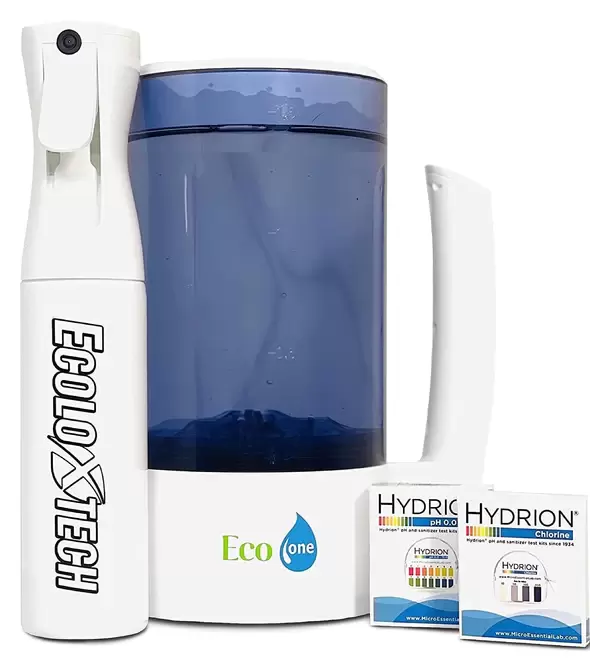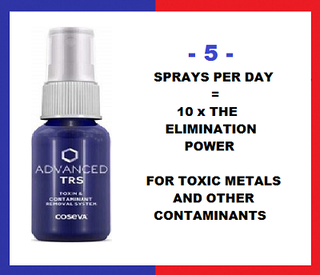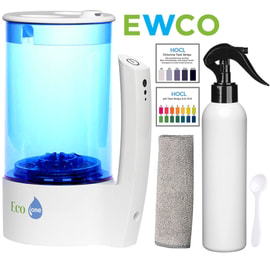Preparing For The Hurricane
PREPARING FOR THE STORM'S APPROACH
The thought of a hurricane coming is enough to make even a seasoned hurricane prep pro have second thoughts about evacuating. If you are like me, you really don't care for all the work that goes into making the house secure. If you live in an apartment, you may not even get a landlord to come and secure your windows. Hope you have renters insurance which is quite inexpensive.
First Things First: Communication after the storm will be important. While you prepare for the hurricane, make sure you have the app "Zello Walkie Talkie." This is an app that people used in Texas after hurricane Harvey. If your phone service does not work, the app allows you to communicate with your friends and family. You can find it in the app store for Iphone and play store for android users.
Let your friends and family know! We are not sure whether it will work for public services. Do it now!!!! Don't wait!!! They say it works globally, so please share!
*********************************************************
1. Charge any device that provides light. Laptops, tablets, cameras, video cameras, and old phones. Old cell phones can still used for dialing 911. Charge external battery back ups.
2. Wash all trash cans, big and small, and fill with water for flushing toilets. Line outdoor trash cans with trash bags, fill with water and store in the garage. Add bleach to sterilize.
3. Fill every tub and sink with water. Cover sinks with Saran Wrap to keep it from collecting dust. Fill washing machine and leave lid up to store water.
4. Fill old empty water bottles and other containers with water and keep near sinks for washing hands.
5. Fill every Tupperware with water and store in freezer. These will help keep food cold longer and serve as a back up water supply.
6. Fill drinking cups with water and cover with Saran Wrap. Store as many as possible in fridge. The rest you can store on the counter and use first before any water bottles are opened. Ice is impossible to find after the storm.
7. Reserve fridge space for storing tap water and keep the sealed water bottles on the counter.
8. Cook any meats in advance and other perishable foods. You can freeze cooked food. Hard boil eggs for snacks for first day without power.
9. Be well hydrated before the storm hits and avoid salty foods that make you dehydrated.
10. Wash all dirty clothes and bed sheets. Anything dirty will smell without the A/C, you may need the items, and with no A/C, you'll be sweating a lot. You're going to want clean sheets.
11. Toss out any expiring food, clean cat litter boxes, empty all trash cans in the house, including bathrooms. Remove anything that will cause an odor when the A/C is off. If you don't have a trash day pickup before the storm, find a dumpster.
12. Bring in any yard decor, secure anything that will fly around, secure gates, bring in hoses, potted plants, etc. Bring in patio furniture and grills.
13. Clean your environment so you have clear, easy escape routes. Even if that means temporarily moving furniture to one area.
14. Scrub all bathrooms so you are starting with a clean odor free environment. Store water filled trash cans next to each toilet for flushing.
15. Place everything you own that is important and necessary in a backpack or small file box that is easy to grab. Include your wallet with ID, phone, hand sanitizer, snacks, etc. Get plastic sleeves for important documents.
16. Make sure you have cash on hand.
17. Stock up on pet food and fill up bowls of water for pets.
18. Refill any medications. Most insurance companies allow for 2 emergency refills per year.
19. Fill your propane tanks. You can heat soup cans, boil water, make coffee, and other stuff besides just grilling meat. Get an extra, if possible.
20. Drop your A/C in advance and lower temperatures in your fridges.
21. Gather all candles, flashlights, lighters, matches, batteries, and other items and keep them accessible.
22. Clean all counters in advance. Start with a clean surface. Buy Clorox Wipes for cleaning when there is no power. Mop your floors and vacuum. If power is out for 10 days, you'll have to live in the mess you started with.
23. Pick your emergency safe place such as a closet under the stairs. Store the items you'll need in that location for the brunt of the storm. Make a hand fan for when the power is out.
24. Shower just before the storm is scheduled to hit.
The thought of a hurricane coming is enough to make even a seasoned hurricane prep pro have second thoughts about evacuating. If you are like me, you really don't care for all the work that goes into making the house secure. If you live in an apartment, you may not even get a landlord to come and secure your windows. Hope you have renters insurance which is quite inexpensive.
First Things First: Communication after the storm will be important. While you prepare for the hurricane, make sure you have the app "Zello Walkie Talkie." This is an app that people used in Texas after hurricane Harvey. If your phone service does not work, the app allows you to communicate with your friends and family. You can find it in the app store for Iphone and play store for android users.
Let your friends and family know! We are not sure whether it will work for public services. Do it now!!!! Don't wait!!! They say it works globally, so please share!
*********************************************************
1. Charge any device that provides light. Laptops, tablets, cameras, video cameras, and old phones. Old cell phones can still used for dialing 911. Charge external battery back ups.
2. Wash all trash cans, big and small, and fill with water for flushing toilets. Line outdoor trash cans with trash bags, fill with water and store in the garage. Add bleach to sterilize.
3. Fill every tub and sink with water. Cover sinks with Saran Wrap to keep it from collecting dust. Fill washing machine and leave lid up to store water.
4. Fill old empty water bottles and other containers with water and keep near sinks for washing hands.
5. Fill every Tupperware with water and store in freezer. These will help keep food cold longer and serve as a back up water supply.
6. Fill drinking cups with water and cover with Saran Wrap. Store as many as possible in fridge. The rest you can store on the counter and use first before any water bottles are opened. Ice is impossible to find after the storm.
7. Reserve fridge space for storing tap water and keep the sealed water bottles on the counter.
8. Cook any meats in advance and other perishable foods. You can freeze cooked food. Hard boil eggs for snacks for first day without power.
9. Be well hydrated before the storm hits and avoid salty foods that make you dehydrated.
10. Wash all dirty clothes and bed sheets. Anything dirty will smell without the A/C, you may need the items, and with no A/C, you'll be sweating a lot. You're going to want clean sheets.
11. Toss out any expiring food, clean cat litter boxes, empty all trash cans in the house, including bathrooms. Remove anything that will cause an odor when the A/C is off. If you don't have a trash day pickup before the storm, find a dumpster.
12. Bring in any yard decor, secure anything that will fly around, secure gates, bring in hoses, potted plants, etc. Bring in patio furniture and grills.
13. Clean your environment so you have clear, easy escape routes. Even if that means temporarily moving furniture to one area.
14. Scrub all bathrooms so you are starting with a clean odor free environment. Store water filled trash cans next to each toilet for flushing.
15. Place everything you own that is important and necessary in a backpack or small file box that is easy to grab. Include your wallet with ID, phone, hand sanitizer, snacks, etc. Get plastic sleeves for important documents.
16. Make sure you have cash on hand.
17. Stock up on pet food and fill up bowls of water for pets.
18. Refill any medications. Most insurance companies allow for 2 emergency refills per year.
19. Fill your propane tanks. You can heat soup cans, boil water, make coffee, and other stuff besides just grilling meat. Get an extra, if possible.
20. Drop your A/C in advance and lower temperatures in your fridges.
21. Gather all candles, flashlights, lighters, matches, batteries, and other items and keep them accessible.
22. Clean all counters in advance. Start with a clean surface. Buy Clorox Wipes for cleaning when there is no power. Mop your floors and vacuum. If power is out for 10 days, you'll have to live in the mess you started with.
23. Pick your emergency safe place such as a closet under the stairs. Store the items you'll need in that location for the brunt of the storm. Make a hand fan for when the power is out.
24. Shower just before the storm is scheduled to hit.
25. Keep baby wipes next to each toilet. Don't flush them. It's not the time to risk clogging your toilet!
26. Run your dishwasher, don't risk having dirty smelly dishes and you need every container for water! Remember you'll need clean water for brushing your teeth, washing yourself, and cleaning your hands.
27. Put a small suitcase in your car in case you decide to evacuate. Also put at least one jug of water in your car. It will still be there if you don't evacuate! You don't need to store all water in the house. Remember to pack for pets as well.
28. Check on all family members, set up emergency back up plans, and check on elderly neighbors.
29. Remember, pets are family too. Take them with you!
30. Before the storm, unplug all electronics. There will be power surges during and after the storm.
31. Gas up your car and have a spare gas container for your generator or your car when you run out.
32. If you can, take a video of your house and contents....walk room to room--open cabinets/drawers and closets. This will help if you need to make a claim later. It will show proof of items and help you list all the items (help your memory, so you don't forget anything)...I highly recommend!!!
33. I also heard you should freeze a cup of water, place a coin on top after it is frozen...keep this in your freezer to help you gauge the temperature if the power goes out. If the coin stays on top, the food is staying frozen. If the coin falls into the water, the freezer thawed out and most food will likely need to be thrown away.
This is super helpful is you have to leave and come back, as it may appear everything is still frozen, but if the coin is in the cup--you will know!!
34. Finally, anything that you want to try and preserve, but you can't take with you---place it in a plastic bin and put in your dishwasher, lock the door---this should make it water tight in case of any water intrusion into your home. But of course, take all the important/irreplaceable items you can!!
May God Protect Us All, As We Ride Out The Storms of Life...Including Those That Mother Nature Brings.
Part of this was copied from a friend. Some great advice for anyone in the storm's path, who is hunkering down. The last item about storing important items in the dishwasher is a great idea.
26. Run your dishwasher, don't risk having dirty smelly dishes and you need every container for water! Remember you'll need clean water for brushing your teeth, washing yourself, and cleaning your hands.
27. Put a small suitcase in your car in case you decide to evacuate. Also put at least one jug of water in your car. It will still be there if you don't evacuate! You don't need to store all water in the house. Remember to pack for pets as well.
28. Check on all family members, set up emergency back up plans, and check on elderly neighbors.
29. Remember, pets are family too. Take them with you!
30. Before the storm, unplug all electronics. There will be power surges during and after the storm.
31. Gas up your car and have a spare gas container for your generator or your car when you run out.
32. If you can, take a video of your house and contents....walk room to room--open cabinets/drawers and closets. This will help if you need to make a claim later. It will show proof of items and help you list all the items (help your memory, so you don't forget anything)...I highly recommend!!!
33. I also heard you should freeze a cup of water, place a coin on top after it is frozen...keep this in your freezer to help you gauge the temperature if the power goes out. If the coin stays on top, the food is staying frozen. If the coin falls into the water, the freezer thawed out and most food will likely need to be thrown away.
This is super helpful is you have to leave and come back, as it may appear everything is still frozen, but if the coin is in the cup--you will know!!
34. Finally, anything that you want to try and preserve, but you can't take with you---place it in a plastic bin and put in your dishwasher, lock the door---this should make it water tight in case of any water intrusion into your home. But of course, take all the important/irreplaceable items you can!!
May God Protect Us All, As We Ride Out The Storms of Life...Including Those That Mother Nature Brings.
Part of this was copied from a friend. Some great advice for anyone in the storm's path, who is hunkering down. The last item about storing important items in the dishwasher is a great idea.
More Tips & Other Important Information
| mdc_announces_additional_shelters_9717.pdf |
| gas_stations_with_generators.pdf |
| monroe_county_emergency_shelters.pdf |
| miami_dade_shelters.pdf |
| broward_county_general_population_emergency_shelters.pdf |
More Hurricane Prep Tips: As seen on Facebook
First I want to say that I am by no means a hurricane expert. I can only share with you my experience of surviving the eye of a Cat 5 hurricane and what life was like after and offer some tips to try to make life a little easier for anyone who wants to take the moment to read.
As this is a Broward group, many, if not most if you can remember Andrew and what happened in Homestead and even have your own stories about how Andrew affected you in Broward. However the Andrew that you went through, and even most of Miami Dade went through is not the same Andrew that I went through and the rest of Homestead went through. There is something peacefully terrifying about the eye of a Cat 5 storm that is almost impossible to describe.
Besides all the obvious water, batteries etc etc that every Floridian should have memorized by now, here are some more "live and learn" suggestions.
Sandwich and snack size baggies:
You are going to lose power! Fill up as many as you can and start packing your freezer. I like the snack size bags because you can wedge them a little easier and really make a good solid ice packing in your freezer. I have 2 freezers and plan to move all food into one that will run off a generator and just stack as many ice baggies as I can into the other. It will take hours for them to become solid ice so start as soon as you can. You are basically turning your freezer into a giant cooler. I also like the sandwich size bags as they create a bigger size block of ice that takes a little longer to melt. As these start melting, you can use the water from the bags to give to your pets. Water is a huge commodity right now so finding ways to dual purpose water is invaluable.
Bug spray and sun screen:
Get some. Without power, you're not going to be sitting inside your house baking like an oven, unless you like that sort of thing. You're going to be outside doing clean up and just escaping the heat inside the house and the sun and bugs can and will get you, especially at night.
Important papers and pictures:
After the storm, you will need to call insurance companies etc. Make sure your Birth Certificates, Social Security Cards, Id's, Pet's records, your own medical records, etc etc are all in a safe place. I place mine in a Rubbermaid type file box and then put that in a garbage bag that then goes in a storage tote that is duct tape sealed. Any important pictures that can't be replaced are also stored in the tote. We live in a digital world but some stuff can't be replaced. I have no pictures of my youth because of this very reason.
Pets:
They will not be the same after a Cat 5 hurricane. I hope you've thought of them as much as yourself in your prep. Make sure you have at the minimum 2 weeks of food for them. Make sure their collars and harnesses are on during the storm. If you don't have an ID tag on your pets collar that has your phone number or address, go to Petco or Pet Supermarket and spend the $5 to have one made.
PLEASE do not think that just because your pet has a chip that you're doing your pet or anyone else a favor in returning your pet to you should anything happen during a hurricane. You know that chip has to be scanned by a vet and technology will have to be used to find you. With no power etc your pet will spend days on the streets or in a kennel somewhere until the resources can be spared to scan and find you. Sometimes the old fashioned tag on the collar works best to get your pet back home to you with a simple phone call. PLEASE think of your pets.
Laundry:
Get it all done now. The only articles of clothing or bed linens or towels that should need washing are the clothes on your bodies. You will thank me for this one later. Get it all done before the storm hits. It's invaluable.
That's all my brain can muster up at this moment and I need to get back to prepping but I'll add more as I think about it.
Hope this helps someone and y'all stay safe and smart.
More Tips from FB Friends.
FLORIDA......
Buy garbage bags fill them up with water tie a knot and hang it on the door. Hang 6 bags minimum per door.
Drill plywood to the windows.
Unplug all appliances and electronics. ...
If there's more then one cellular device in the house turn all of them off and only keep one on at a time. Down load the ZELLO app. And pay attention to what's going on.
Each person carry personal zip lock bags on them holding there wallets,cell phones and chargers. Buy a solar sun pack charger.
Just hold it in the light and it'll automatically charge your phone.
Grab your brightest towel or shirt and tie a knot onto a pole or window. If there's a tree in front of your house grab a knife or spray paint bottle and mark a line for every occupant in the house. Make a long mark for a human
Make 1/2 length mark for pets. Empty out your dishwasher and place all documents,pictures, and important pieces in the washer which also works as a safe.
BUT overall, DON'T BE HARD HEADED. If you are in an evacuation zone and you can leave, PLEASE LEAVE.
Why risk it! There are list above with the name and address of Shelters in South Florida.
First I want to say that I am by no means a hurricane expert. I can only share with you my experience of surviving the eye of a Cat 5 hurricane and what life was like after and offer some tips to try to make life a little easier for anyone who wants to take the moment to read.
As this is a Broward group, many, if not most if you can remember Andrew and what happened in Homestead and even have your own stories about how Andrew affected you in Broward. However the Andrew that you went through, and even most of Miami Dade went through is not the same Andrew that I went through and the rest of Homestead went through. There is something peacefully terrifying about the eye of a Cat 5 storm that is almost impossible to describe.
Besides all the obvious water, batteries etc etc that every Floridian should have memorized by now, here are some more "live and learn" suggestions.
Sandwich and snack size baggies:
You are going to lose power! Fill up as many as you can and start packing your freezer. I like the snack size bags because you can wedge them a little easier and really make a good solid ice packing in your freezer. I have 2 freezers and plan to move all food into one that will run off a generator and just stack as many ice baggies as I can into the other. It will take hours for them to become solid ice so start as soon as you can. You are basically turning your freezer into a giant cooler. I also like the sandwich size bags as they create a bigger size block of ice that takes a little longer to melt. As these start melting, you can use the water from the bags to give to your pets. Water is a huge commodity right now so finding ways to dual purpose water is invaluable.
Bug spray and sun screen:
Get some. Without power, you're not going to be sitting inside your house baking like an oven, unless you like that sort of thing. You're going to be outside doing clean up and just escaping the heat inside the house and the sun and bugs can and will get you, especially at night.
Important papers and pictures:
After the storm, you will need to call insurance companies etc. Make sure your Birth Certificates, Social Security Cards, Id's, Pet's records, your own medical records, etc etc are all in a safe place. I place mine in a Rubbermaid type file box and then put that in a garbage bag that then goes in a storage tote that is duct tape sealed. Any important pictures that can't be replaced are also stored in the tote. We live in a digital world but some stuff can't be replaced. I have no pictures of my youth because of this very reason.
Pets:
They will not be the same after a Cat 5 hurricane. I hope you've thought of them as much as yourself in your prep. Make sure you have at the minimum 2 weeks of food for them. Make sure their collars and harnesses are on during the storm. If you don't have an ID tag on your pets collar that has your phone number or address, go to Petco or Pet Supermarket and spend the $5 to have one made.
PLEASE do not think that just because your pet has a chip that you're doing your pet or anyone else a favor in returning your pet to you should anything happen during a hurricane. You know that chip has to be scanned by a vet and technology will have to be used to find you. With no power etc your pet will spend days on the streets or in a kennel somewhere until the resources can be spared to scan and find you. Sometimes the old fashioned tag on the collar works best to get your pet back home to you with a simple phone call. PLEASE think of your pets.
Laundry:
Get it all done now. The only articles of clothing or bed linens or towels that should need washing are the clothes on your bodies. You will thank me for this one later. Get it all done before the storm hits. It's invaluable.
That's all my brain can muster up at this moment and I need to get back to prepping but I'll add more as I think about it.
Hope this helps someone and y'all stay safe and smart.
More Tips from FB Friends.
FLORIDA......
Buy garbage bags fill them up with water tie a knot and hang it on the door. Hang 6 bags minimum per door.
Drill plywood to the windows.
Unplug all appliances and electronics. ...
If there's more then one cellular device in the house turn all of them off and only keep one on at a time. Down load the ZELLO app. And pay attention to what's going on.
Each person carry personal zip lock bags on them holding there wallets,cell phones and chargers. Buy a solar sun pack charger.
Just hold it in the light and it'll automatically charge your phone.
Grab your brightest towel or shirt and tie a knot onto a pole or window. If there's a tree in front of your house grab a knife or spray paint bottle and mark a line for every occupant in the house. Make a long mark for a human
Make 1/2 length mark for pets. Empty out your dishwasher and place all documents,pictures, and important pieces in the washer which also works as a safe.
BUT overall, DON'T BE HARD HEADED. If you are in an evacuation zone and you can leave, PLEASE LEAVE.
Why risk it! There are list above with the name and address of Shelters in South Florida.
Why are 2017 Hurricanes so Dangerous?
For the first time in modern history, three hurricanes in the Atlantic are lined up in the most dangerous of ways, according to Eric Blake, a hurricane specialist at the National Hurricane Center.
Eric Said:
What climate change creates
"The rising strength and potential impact of the hurricanes in the Atlantic basin has weather experts concerned, as global temperatures continuing to hit record highs. Global warming, which isn’t necessarily causing the formation of hurricanes, is almost certainly magnifying their intensity and potential for destruction.
Climate change is making hurricanes more powerful for longer periods of time. They need the energy from the warm, humid air above tropical oceans to keep up their strength. A hurricane begins as a tropical storm, when winds coming from different directions converge. Warm air rises around the storm’s center and cools, and the moisture condenses to form clouds and rain. Condensation releases latent heat, which powers hurricanes. If the layer of warm water isn’t at least 200 feet deep, a tropical storm could die before gaining hurricane strength.
The potential for destruction is also greater because warmer temperatures mean the air can hold more moisture, so hurricanes produce more rain, causing more floods. Rising sea levels also lead to greater and greater surges after a storm."
Dr. Gerry Bell, lead seasonal hurricane forecaster at the National Oceanic and Atmospheric Administration’s Climate Prediction Center, told The New York Times that warming waters, along with a relative lack of sudden wind shift, have created optimal hurricane conditions this season.
"Some environmentalists think it is a “moral duty” to talk about the role climate change plays in making these three hurricanes so intense. Global warming is a long-term threat, yet research has shown that short-term concerns are what really motivate humans. And the scientific community feels it’s a conversation we should be having when storms strike.
The sooner we start the conversation, the more people will see global warming as having a direct impact on natural disasters. Only then can start the next one: how to actually do something about it."
This was excerpted from an article originally posted at: https://qz.com/1072166/irma-jose-and-katia-three-hurricanes-in-one-satellite-image/?utm_source=qzfb
What climate change creates
"The rising strength and potential impact of the hurricanes in the Atlantic basin has weather experts concerned, as global temperatures continuing to hit record highs. Global warming, which isn’t necessarily causing the formation of hurricanes, is almost certainly magnifying their intensity and potential for destruction.
Climate change is making hurricanes more powerful for longer periods of time. They need the energy from the warm, humid air above tropical oceans to keep up their strength. A hurricane begins as a tropical storm, when winds coming from different directions converge. Warm air rises around the storm’s center and cools, and the moisture condenses to form clouds and rain. Condensation releases latent heat, which powers hurricanes. If the layer of warm water isn’t at least 200 feet deep, a tropical storm could die before gaining hurricane strength.
The potential for destruction is also greater because warmer temperatures mean the air can hold more moisture, so hurricanes produce more rain, causing more floods. Rising sea levels also lead to greater and greater surges after a storm."
Dr. Gerry Bell, lead seasonal hurricane forecaster at the National Oceanic and Atmospheric Administration’s Climate Prediction Center, told The New York Times that warming waters, along with a relative lack of sudden wind shift, have created optimal hurricane conditions this season.
"Some environmentalists think it is a “moral duty” to talk about the role climate change plays in making these three hurricanes so intense. Global warming is a long-term threat, yet research has shown that short-term concerns are what really motivate humans. And the scientific community feels it’s a conversation we should be having when storms strike.
The sooner we start the conversation, the more people will see global warming as having a direct impact on natural disasters. Only then can start the next one: how to actually do something about it."
This was excerpted from an article originally posted at: https://qz.com/1072166/irma-jose-and-katia-three-hurricanes-in-one-satellite-image/?utm_source=qzfb

